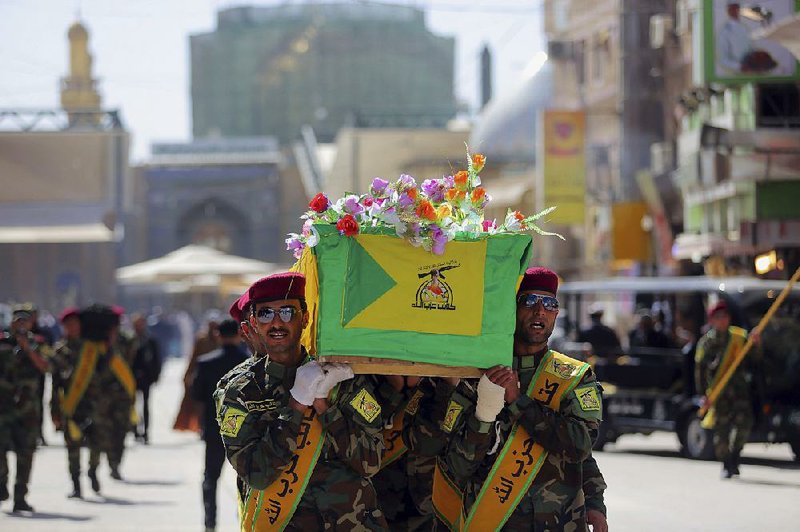BAGHDAD -- Backed by allied Shiite, Sunni and Iranian fighters, Iraqi security forces began a large-scale military operation Monday to recapture Saddam Hussein's hometown from Islamic State extremists, a major step in a campaign to reclaim territory in northern Iraq controlled by the militants.
Previous attempts to capture the city have failed, and hours into Monday's operation, the military said it hadn't yet entered Tikrit. Retaking it will help Iraqi forces secure a major supply link for any future operation to retake Mosul, Iraq's second-largest city, which has been under militant rule since June.
State-run Al-Iraqiya television said forces were attacking from different directions, backed by artillery and airstrikes by Iraqi fighter jets. It said the militants were dislodged from some areas outside the city, but several hours into the operation, it gave no additional details.
Tikrit, the capital of Salahuddin province, 80 miles north of Baghdad, fell to the Islamic State in the summer, along other areas in the country's Sunni heartland.
U.S. military officials have said a coordinated military mission to retake Mosul likely will begin in April or May and involve up to 25,000 Iraqi troops. But the Americans have cautioned that if the Iraqis aren't ready, the offensive could be delayed.
The U.S.-led coalition launching airstrikes targeting the Islamic State was not involved in the Tikrit operation, Iraqi officials said. A Pentagon spokesman, Army Col. Steve Warren, said the U.S. was alerted to the offensive before it started Monday but was not asked to provide air power.
"Right now we are not providing any air power to support the Iraqi operation in the city of Tikrit," Warren said in Washington. "We did note the Iraqi government's statements that they are emphasizing minimization of collateral damage, and we are continuing to monitor it."
Iraqi forces apparently have the help of Iranian Gen. Ghasem Soleimani, the commander of the elite Revolutionary Guard's Quds Force, who arrived two days ago, Iran's semi-official Fars news agency reported.
The general has emerged as the chief tactician in Iraq's fight against the Sunni militants, working on the front lines alongside dozens of advisers to direct Shiite militiamen and government forces.
Fars also reported drones were flying over Tikrit, without identifying whether they were Iranian or Iraqi.
The military commander of Salahuddin province, Gen. Abdul-Wahab al-Saadi, told state TV that fighting was taking place outside Tikrit mainly on its eastern side.
"Until this moment we have not entered the city," al-Saadi said. "God willing, we will enter, but we need some time as planned. ... God willing, victory will be achieved and Salahuddin will be turned into a grave for all terrorist groups."
Tikrit is an important test case for Iraq's Shiite-led government, which is trying to reassert authority over the divided country.
The offensive comes as momentum has begun to shift since Iraqi soldiers, backed by airstrikes from the U.S.-led coalition, took back the nearby refinery town of Beiji in November. Any operation to take Mosul would require Iraq to seize Tikrit first because of its strategic location.
Iraq is split between minority Sunnis, who were an important base of support for Saddam, and the Shiite majority. Since Saddam was toppled in a U.S.-led invasion in 2003, the Sunnis have felt increasingly marginalized by the Shiite-led government in Baghdad, and in 2006 long-running tensions boiled over into sectarian violence that claimed tens of thousands of lives.
While state TV said Shiite and Sunni tribal fighters were cooperating in Monday's offensive, Tikrit is a Sunni stronghold, and the presence of Shiite forces could prompt a backlash. The Iraqi military is heavily dependent on Shiite militias that have been accused of abusing Sunni communities elsewhere.
Hours after the offensive began, the United Nations' special envoy in Iraq appealed to warring groups to avoid attacking civilians.
"Military operations reinforced by international and Iraqi air support must be conducted with the utmost care to avoid civilian casualties, and with full respect for fundamental human rights principles and humanitarian law," Nickolay Mladenov said in a statement.
South of Tikrit on Monday afternoon, a gasoline tanker rigged with a bomb exploded as soldiers and Shiite militiamen tried to dismantle it in the village of al-Jalam, killing seven troops and wounding 15, police and hospital officials said.
All officials spoke on condition of anonymity because they were not authorized to speak to journalists.
Ahead of the operation, Prime Minister Haider al-Abadi, a Shiite, called on Sunni tribal fighters to abandon the Islamic State, offering what he described as "the last chance" and promising them a pardon.
Information for this article was contributed by Amir Vahdat, Robert Burns and Edith M. Lederer of The Associated Press.
A Section on 03/03/2015


